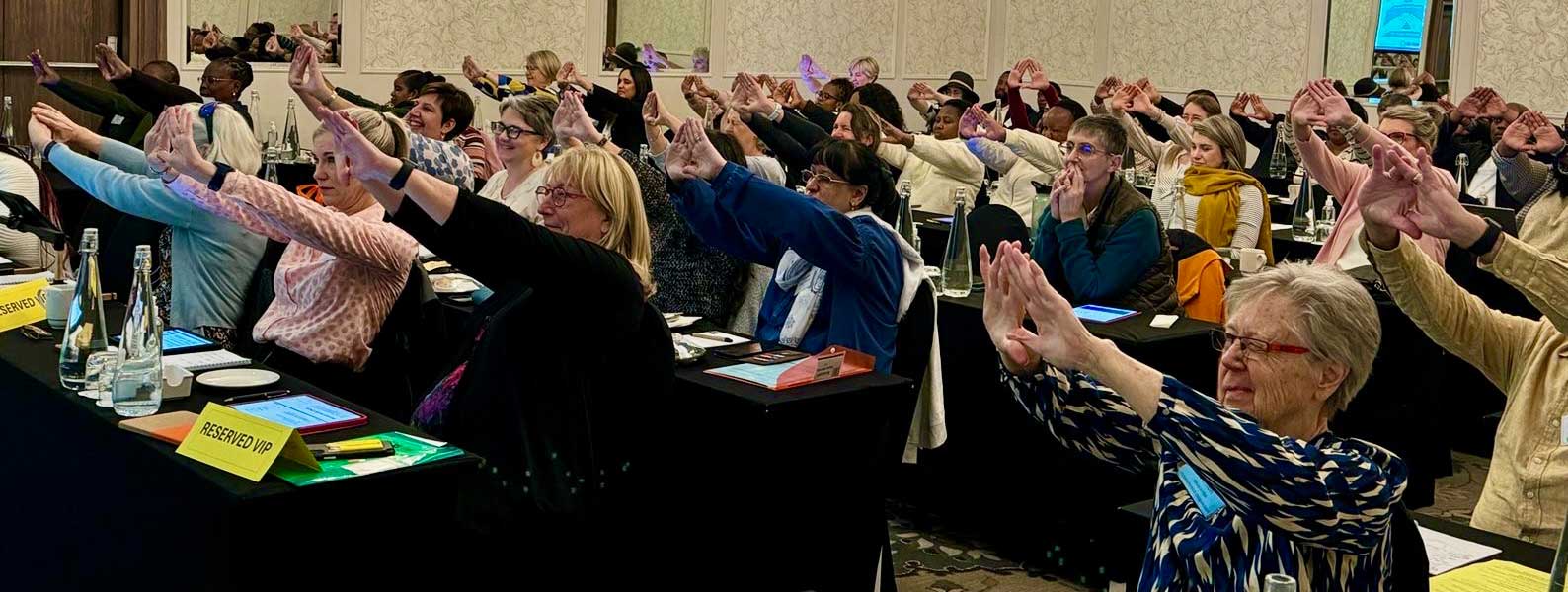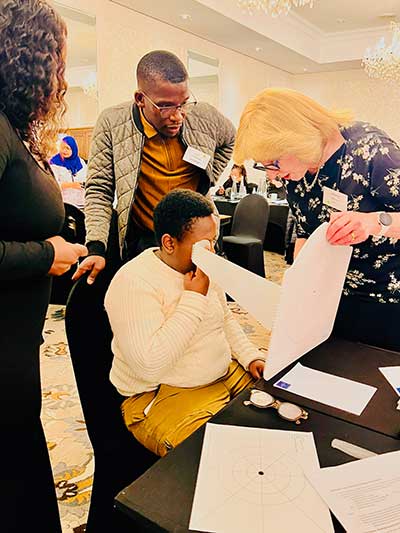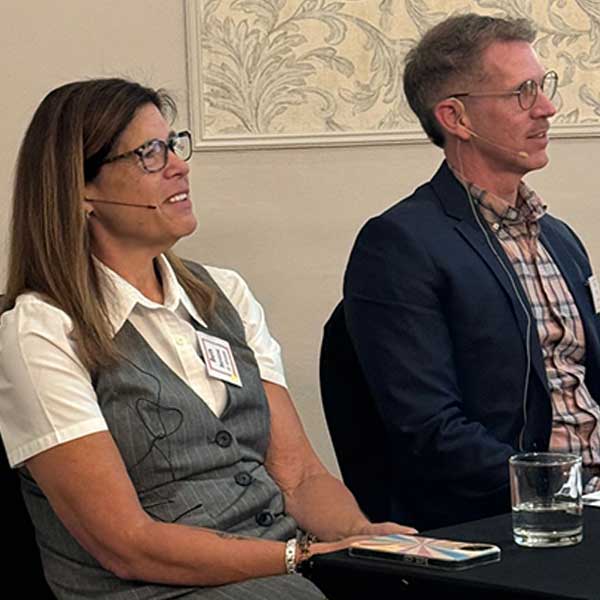 Attendees at the Low Vision Matters conference gathered in Johannesburg, South Africa, in early September to hear UAB’s Beth Barstow, PhD, OTR/L, SCLV, and Jason Vice, PhD, OTR/L, SCLV, speak about low vision evaluation, assessment, and intervention, and spend a day in hands-on labs. Wendy Histed, a local optometrist with expertise in bioethics and health law, discussed ethical issues in low vision care.
Attendees at the Low Vision Matters conference gathered in Johannesburg, South Africa, in early September to hear UAB’s Beth Barstow, PhD, OTR/L, SCLV, and Jason Vice, PhD, OTR/L, SCLV, speak about low vision evaluation, assessment, and intervention, and spend a day in hands-on labs. Wendy Histed, a local optometrist with expertise in bioethics and health law, discussed ethical issues in low vision care.
Each day ended with reflections on the context of the information to practice in South Africa, where nearly 1 in 10 individuals have vision loss. More than 60 people from across the country, and a few from Namibia, attended the conference, which was sponsored by the UAB Department of Occupational Therapy and the Johannesburg-based Low Vision Centre of Learning.
 Both organizations are committed to serving individuals with vision loss by providing education and training that ensures practitioners can provide up-to-date, high-quality low vision care, said Dr. Barstow, professor of occupational therapy and director of UABs Low Vision Rehabilitation Graduate Certificate program.
Both organizations are committed to serving individuals with vision loss by providing education and training that ensures practitioners can provide up-to-date, high-quality low vision care, said Dr. Barstow, professor of occupational therapy and director of UABs Low Vision Rehabilitation Graduate Certificate program.
Optometrist Hazel Sacharowitz, occupational therapist Belinda Leibowitz, and Karen Denton, Head of Education and Advocacy with Retina SA, were the primary organizers for the conference. The event was part of an ongoing collaboration between UAB and the Low Vision Centre to develop and train a network of low vision rehabilitation providers in South Africa.
Many partnerships were formed between optometrists and occupational therapists that previously had not existed, as the two professions learned more about each other’s role in addressing low vision and how the two professions could work together to improve low vision services, said Dr. Vice.
This was the second trip to South Africa related to this effort for Dr. Barstow, whose research focuses on the influence of low vision and disability on participation in occupations and access to healthcare systems. Dr. Vice, also visiting for the second time, is an assistant professor of occupational therapy with a busy clinical practice in UAB’s Center for Low Vision Rehabilitation. His research is aimed at improving clinical interventions for low vision conditions, such as macular degeneration and hemianopia.
Sharing knowledge and a passion for low vision
Dr. Barstow’s and Dr. Vice’s lectures focused on the evaluation and intervention for visual impairment caused by age-related or neurologic conditions. They also discussed the impact of vision loss on occupational performance, screening options for visual function in various environments, accessible reading materials, environmental modifications, adaptive equipment and technology, and more.
These talks attracted a multidisciplinary group of practitioners. Occupational therapists and optometrists were the largest contingent, but nurses, social workers, orientation and mobility practitioners, researchers, and at least one genetic counselor attended as well.
 “A collaborative approach to low vision rehabilitation services is beginning to emerge in South Africa. The expertise exists but the connections have not been forged. This conference moved the needle in the right direction,” said Dr. Barstow.
“A collaborative approach to low vision rehabilitation services is beginning to emerge in South Africa. The expertise exists but the connections have not been forged. This conference moved the needle in the right direction,” said Dr. Barstow.
The event also welcomed individuals with low vision and their caregivers. One such attendee was Jennifer Webster, who has vision loss caused by Stargardt disease. This rare disorder results from a genetic change that short-circuits the body’s ability to remove fatty deposits from the macula, the part of the retina needed for clear central vision.
Ms. Webster’s small business in Cape Town helps individuals with new vision loss process their grief and learn to use assistive technology. She said she found Dr. Barstow’s discussion of inclusive design for non-readers particularly helpful.
“As a visually impaired person,” she wrote on the attendees’ WhatsApp group, “I am grateful to all of you in the various professions for wanting to learn more about how to help us. The next generation will be reaping what you are sowing in this season.”
Attendees spent the last day of the conference practicing techniques and using the equipment they’d learned about. As the event came to a close, Petro Grové, an occupational therapist in private practice in Pretoria, shared this lyrical feedback on WhatsApp:
What a privilege to:
- have a brain full of new sparks
- have a heart with new connections
- have a very full belly
- have hands to take and make a difference together
- have eyes that led me to my purpose

